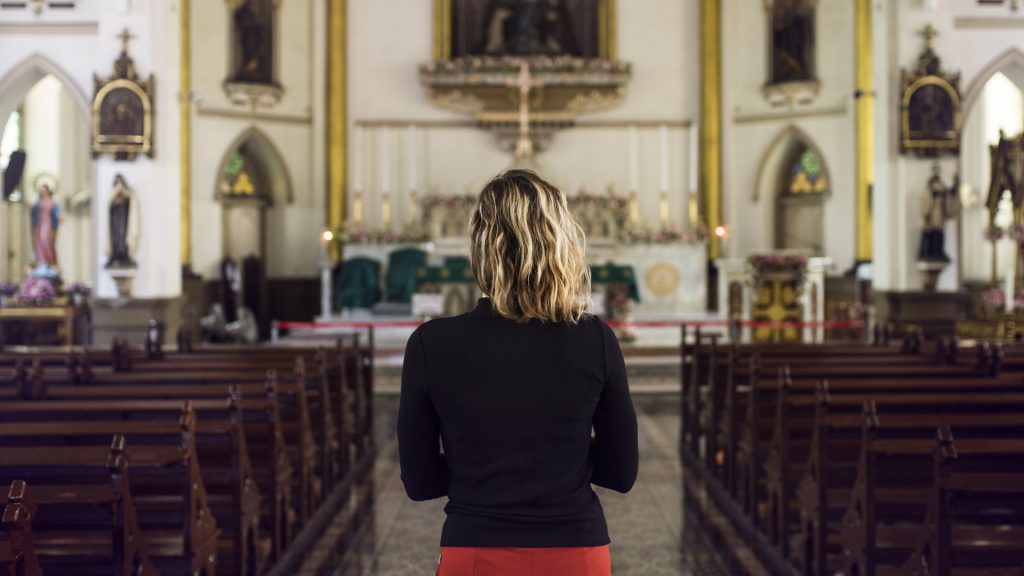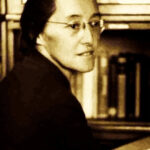
Published October 21, 2019
The topic of “women” has surfaced regularly in discussions at the Special Assembly of the Synod of Bishops on the Pan-Amazonia Region. And rightly so, argued John Allen of Crux, as Catholic women do indispensable work on the ground, teaching, serving, and supporting the faith of families and communities in Amazonia.
On the whole, it is a welcome development to see more women, including religious sisters, among the experts and observers taking part in the synod discussions. Their participation makes sense. At a recent synod press briefing, Columbian Sister Alba Teresa Cediel Castillo described religious sisters as bringing important stability to Catholic outreaches in the Amazon, where priests are scarce. “What do we do?” she asked, “Well, everything that a woman can do,” from baptizing to educating to accompanying the people in their trials. Indeed, women are at the center of family life and parish communities throughout the world Church and lead countless apostolates and religious orders. It is vital, then, to consider women’s insights, experience, expertise, and prayerful wisdom in any serious discussion about the Church’s evangelical mission.
Women participating in the synod say their contributions are, in fact, being considered thoughtfully. According to Peruvian Sr. Birgit Weiler, “We are really accepted as part of the group. There is not a clerical attitude. There is a lot of freedom of speech and it is a beautiful experience really to discern together.” The “open atmosphere” of the discussion, she adds, encourages women to raise “critical questions…respectfully but openly.” All good.
Even so, some synod interventions (or at least news reports of such interventions) that address women’s participation and leadership seem infected with mirror strains of an old feminist virus.
One strain of this virus actually promotes an odd clericalism, implicitly branding women’s work in the Church as inherently inferior because women don’t wear clerical collars or conduct ordained ministries. This line of thinking surfaces in the continued calls by synod presenters for a female diaconate or “official” ministries led by women. It seems premised on the belief that the Church’s teaching on the equal dignity of women will forever ring hollow—and engender righteous “bitterness” among women—if women are “excluded” from official positions of authority within the Church’s hierarchical (male) structure.
A second strain imports a wholly secular mindset into the conversation. It regards the Church as a corporate structure, and women’s “progress” and elevation to leadership as corporate goals to be pursued and measured—as if the triumph of data-analytics will fix the Church’s sputtering engine of evangelism. This line of thinking derives from the political pressure of feminist agitators who seem convinced that the Church is little more than a creaky corporation, a fusty old men’s club that deserves to be shaken up. (Sr. Simone Campbell of “Nuns on the Bus” fame derides the Church as a “monarchy” that women must lobby.)
The week before the synod opened, a coalition of women’s “reform” organizations and religious sisters gathered in Rome for a rally and conference. After a fruitless forty-year campaign for women’s ordination, campaigners for women’s “equality” in the Church still accuse the Vatican of the “structural and spiritual oppression of women,” and still seek to dethrone the “patriarchy” or at least neuter its offspring, “clericalism.” Some organizations, like Future Church and the Women’s Ordination Conference, openly dissent from Catholic teachings on sexual morality, marriage, and priestly ordination. Others, like Voices of Faith, dance around the ordination and sexuality questions but collaborate with radical groups in a power-seeking agenda.
Banging the drum for women’s “equality,” the coalition staged demonstrations, carried signs, and organized a petition drive seeking “full voting rights” for women at the synod to redress the “injustice” of synod rules that limit women to consultation, precluding them from voting. Religious sisters donned capes emblazoned with the message “Votes for Catholic Women,” and projected the “votes” mantra by light beams onto the walls of the Vatican. The attention-getting maneuvers of the sister “suffragettes,” as Crux called them, seem sadly reminiscent of the indignant, sash-wearing Mrs. Banks in Mary Poppins. It’s hard to take seriously.
These groups have succeeded, however, in proposing a more palatable framing for their demands: “Gender equality” in the Church now carries a corporate gloss. The cry for synod “voting rights” is part of a larger drive for the Church to recognize “women as change agents” capable of assuming a “full leadership role in the Church.” Voices of Faith has set a goal to see “30% of leadership positions at the global level of the Roman Catholic Church open to and filled by women” by 2030. Their roadmap includes “merit-based and transparent hiring practices,” a “workplace gender equality policy,” and “monitoring and evaluation.” Such policies are presented as a matter of “fairness,” as well as signs of the Church’s commitment to good governance, efficiency, and best practices. All this provides context for the insistent push during the Special Synod on Amazonia to identify “official ministries” and titles for women, including (potentially) women deacons, and to approach these questions through the lens of functional utility as much as empowerment.
Sure enough, Vatican News (which is run by the Vatican’s Dicastery for Communications) reported that, early in the synod, proposals to “establish a female lay ministry for evangelization” were put on the table, offered as a path toward “greater active participation of women in the life of the Church” as well as a solution to challenging local circumstances in the Amazon region. By the end of the first week, the call for “new ministries” and “more pastoral responsibility and effective participation,” for women, “even at decision-making levels,” engendered an explicit push for female deacons. Some speakers pressed for continued “discernment” of “the institution of women deacons in the region,” while others highlighted women’s authority as a weapon against the scourge of clericalism: “the inclusion of women…could lay the foundation for a less clerical Church.” Women’s “equitable” inclusion, e.g., “presiding over celebrations of the Word, or leading the activity of a social-charitable nature” serves not only as an antidote to clericalism, but also as a guarantor of “the dignity and equality of women in the entire Pan-Amazonian territory.”
This orchestrated campaign is bearing fruits: The Vatican News summary of October 17 highlights the recurring “theme of women” and the “request to recognize, even in roles of greater responsibility and leadership, the great value offered by the presence of women in their specific service to the Church in the Amazon.” The summary reflects continued pressure for women deacons, portrayed in functional rather than theological terms: “Most Small Groups called for attention to be paid to the issue of the diaconate for women from the perspective of Vatican II, bearing in mind that many functions of this ministry are already performed by women in the region.” The summary then links the female diaconate, as a topic for a future synod, to the notion that “women should be given the power to vote” in Church synods.
Here’s the problem: The secular feminist overlay obscures the mystical reality of the Church and completely misses the point when it comes to women in the Church. “Best practices” are fine in themselves. But they don’t substitute for faith and fidelity. They cannot compensate for a weak or malnourished spiritual life. And they are counter-productive when they displace truth and Church teaching as practical guides. In short, the path to evangelical vitality does not run through quotas, titles, and best practices. Women’s voices need to be heard more fully and frequently, not to please a world concerned with secular-style “gender equality,” but because women are already deeply engaged in the work of evangelism. Their service, leadership, and perspectives need to shape the path forward.
As Pope St. John Paul II wrote in the 1988 apostolic exhortation that completed the work of Synod-987, Christifideles Laici (Christ’s Faithful Laity), lay women in particular have two great tasks—to bring “full dignity to the conjugal life and to motherhood,” and “assuring the moral dimension of culture, namely of a culture worthy of the person.” Today, the dignity of the human person is under global assault. And Catholic women are fully engaged in shaping the moral dimension of culture and testifying with their service to the dignity of the person.
No one doubts that the Church faces severe challenges in fulfilling its divine mission to proclaim the gospel today. The way forward will come from a humble, ever more faithful and faith-filled Catholic Church, however, not from misguided campaigns to apply corporate-style solutions to what are essentially spiritual problems.
Mary Rice Hasson is the Kate O’Beirne Fellow in Catholic Studies at Washington’s Ethics and Public Policy Center and the director of the Catholic Women’s Forum. She has spoken for the Holy See at the United Nations Commission on the Status of Women in 2017, 2018, and 2019, most recently on “Gender Ideology: Ideological Aggression Against Women and Girls.” A graduate of the University of Notre Dame Law School, she and her husband, Seamus Hasson, are the parents of seven children.











